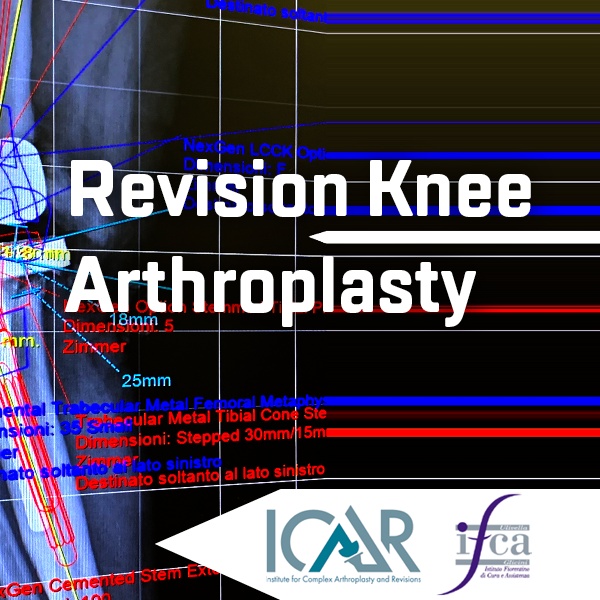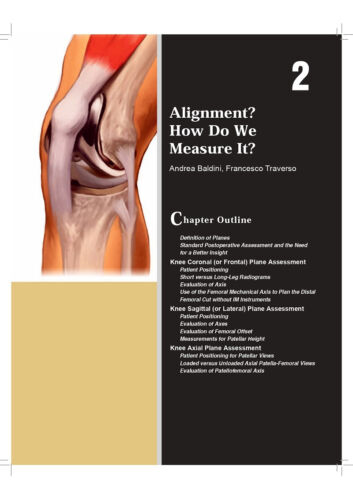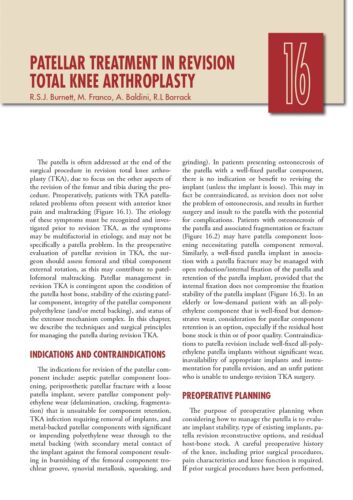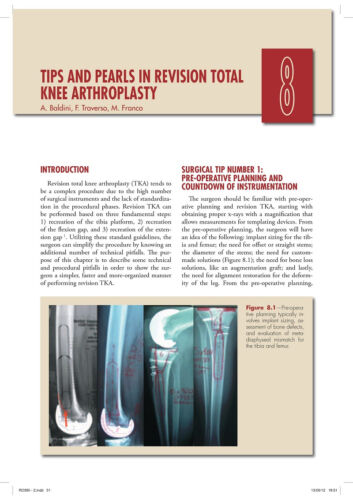ICAR
The Institute for Complex Arthroplasty and Revisions was born in IFCA Clinic after many years of experience in the management of complex hip and knee prosthetic surgery. From an idea of Dr Andrea Baldini in 2020 ICAR merged all the needs to connect in a single direction booth the multidisciplinary work around this demanding type of joints reconstructive surgery.
ICAR’s mission is to provide help and care to patients who need complex prosthetic surgery or who need to replace failed prosthetic implants, acquire data for the scientific development of this sector and educate young surgeons to manage the complexities of this type of surgery.
Patients who come to the center are often sent by colleagues who do not have adequate multidisciplinary support in their structure or experience such as to be able to manage the entire path of the patient who must receive a prosthetic implant with numerous pitfalls, not routine and at greater risk of complications or failure. Complex arthroplasty is defined as an intervention which, either due to the anatomical characteristics of the limb or the patient’s state of health, involves an unusual procedure with the need for special instruments or prostheses, dedicated multi-specialized and usually prolonged medical care, and which exposes the patient at a greater than usual risk of perioperative complications.
In this regard, we have recently published a review that includes both our experience and that present in the scientific literature.
Baldini A, Castellani L, Traverso F, Balatri A, Balato G, Franceschini V. The difficult primary total knee arthroplasty: a review. Bone Joint J. 2015; 97-B (10 Suppl A): 30-39. doi: 10.1302 / 0301-620X.97B10.36920
Revisions of failed prostheses are interventions with an inherent greater complexity due to the abnormal anatomy that remains after the removal of the failed implant. The greater the number of operations undergone, the greater the operative difficulty.
The ICAR institute, actually within IFCA Clinic, makes use of numerous tools necessary for the management of revisions of septic and aseptic prostheses:
- diagnostic algorithm for the study of the painful prosthesis with a laboratory specialized in the analysis of synovial fluid;
- microbiological and infectious disease consultancy;
- radiodiagnostics aimed at prosthetic surgery (fluoroscopy, aid for fine needle aspiration x-ray and echo, CT, MRI with MARS protocol);
- complete fixed deposit of instruments and implants for complex revision surgery;
- connection with national bone banks for tendon and bone transplants;
- operating room personnel trained in prosthetic revision techniques;
- possibility of patient observation in postoperative intensive care;
- constant internal assistance in the ward;
- physiotherapy expert in complex case management and reviews with deviation from standard protocols;
- surgical wound management with advanced dressings and negative pressure and microsurgical counseling.
The results of the interventions of the ICAR Institute are constantly monitored with follow-ups and databases managed by IFCA researchers in compliance with the GDPR and with studies conducted under the aegis of the Ethics Committee of Careggi.
This is a screen-view of the prospective ICAR database which includes over 700 cases of septic and aseptic revision knee arthroplasties followed from 2010. It contains all the data concerning the diagnosis, procedure, postoperative course and subjective and objective data at follow ups.
Members
Collaboratori

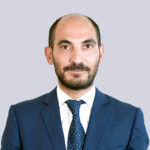

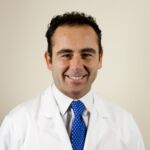









Assistenti alla ricerca


Collaboratori gestione medica



ICAR literature on revision TKA
Click on the titles below to read the documents.
Alignment? How Do We Measure It?
Andrea Baldini, Francesco Traverso
Patellar Treatment in Revision Total knee Arthroplasty
R.S.J. Burnett, M. Franco, A. Baldini, R.L Barrack
Tips and pearls in revision total knee arthroplasty
A. Baldini, F. Traverso, M. Franco
Laboratory-based versus qualitative assessment of α-defensin in periprosthetic hip and knee infections: a systematic review and meta-analysis
Giovanni Balato, Vincenzo de Matteo, Tiziana Ascione, Sigismondo Luca Di Donato, Cristiano De Franco, Francesco Smeraglia, Andrea Baldini, Massimo Mariconda
Fixation Algorithm for Revision TKA
Algoritmo di GesDone Ferita in Fast Track Recovery 2.0
High performance of α-defensin lateral flow assay (Synovasure) in the diagnosis of chronic knee prosthetic infections
Giovanni Balato, Vincenzo Franceschini, Tiziana Ascione, Alfredo Lamberti, Michele D’Amato, Andrea Ensini, Andrea Baldini
Primary Constrained Condylar Knee Arthroplasty without Stem Extensions for the Valgus Knee
John A. Anderson, MD; Andrea Baldini, MD; James H. MacDonald, MD; Paul M. Pellicci, MD; and Thomas P. Sculco, MD
Continuous Antibiotic Therapy Can Reduce Recurrence of Prosthetic Joint Infection in Patients Undergoing 2-Stage Exchange
Tiziana Ascione, MD, Giovanni Balato, MD, PhD, Massimo Mariconda, MD, Renato Rotondo, MD, Andrea Baldini, MD, Pasquale Pagliano, MD
Resuming Elective Orthopaedic Surgery During the COVID-19 Pandemic
J. Parvizi, MD, FRCS, T. Gehrke, MD, C.A. Krueger, MD, E. Chisari, MD, M. Citak, MD, PhD, S. Van Onsem, MD, PhD, W.L. Walter, MBBS, PhD, the International Consensus Group (ICM) and Research Committee of the American Association of Hip
and Knee Surgeons (AAHKS)
Validation of an immunoturbidimetric assay for assessment of C reactive protein in synovial fluid
Fiamma Balboni, Andrea Baldini, Massimo Quercioli, Paola Pezzati, Giovanni Balato, Sabrina Buoro, Giuseppe Lippi
The difficult primary total knee arthroplasty
A. Baldini, L. Castellani, F. Traverso, A. Balatri, G. Balato, V. Franceschini
Constrained Condylar Knee Without Stem Extensions for Difficult Primary Total Knee Arthroplasty
John A. Anderson, MD, MRCS, Andrea Baldini, MD, James H. MacDonald, MD, Ivan Tomek, MD, Paul M. Pellicci, MD, Thomas P. Sculco, MD
Extensor mechanism failure in total knee arthroplasty
Jimmy Ng, Pau Balcells-Nolla, Peter J. James, Benjamin V. Bloch
Bilateral Extensor Mechanism Allograft Reconstruction for Chronic Spontaneous Rupture
Alfredo Lamberti, MD, Francesco Loconte, MD, Antonio Spinarelli, MD, and Andrea Baldini, MD, PhD
General Assembly, Prevention, Operating Room – Personnel: Proceedings of International Consensus on Orthopedic Infections
Andrea Baldini, Kier Blevins, Daniel Del Gaizo, Oliver Enke, Karan Goswami, William Griffin, Pier Francesco Indelli, Toby Jennison, Eustathios Kenanidis, Paul Manner, Robin Patel, Teija Puhto, Parag Sancheti, Rahul Sharma, Rajeev Sharma, Rjajendra Shetty, Rami Sorial, Naasha Talati, T. David Tarity, Kevin Tetsworth, Christos Topalis, Eleftherios Tsiridis, Annette W-Dahl, Matthew Wilson
The role of offset stems in revision knee arthroplasty
Andrea Baldini, Giovanni Balato, Vincenzo Franceschini
Perioperative pain management in fast-track knee arthroplasty
Chiara Caparrini, Irene Miniati, Marco Ponti, Andrea Baldini
Surgical options for chronic patellar tendon rupture in total knee arthroplasty
Alfredo Lamberti, Giovanni Balato, Pier Paolo Summa, Ashok Rajgopal, Attique Vasdev, Andrea Baldini
Management of Patella Tendon Rupture
Giles R. Scuderi, Nicholas B. Frisch, Richard A. Berger, James A. Browne, Mark E. Mildren, Andrea Baldini, Vincenzo Franceschini, Michele D’Amato
Synovial Cell Count Before Reimplantation Can Predict the Outcome of Patients with Periprosthetic Knee Infections Undergoing Two-stage Exchange
Tiziana Ascione, M.D., Giovanni Balato, MD, PhD, Massimo Mariconda, MD, Francesco Smeraglia, MD, Andrea Baldini, MD, Cristiano De Franco, MD, Giuseppe Pandolfo, PhD, Roberta Siciliano, Pasquale Pagliano, Prof
Diagnostic accuracy of synovial fluid, blood markers, and microbiological testing in chronic knee prosthetic infections
Giovanni Balato, Vincenzo Franceschini, Tiziana Ascione, Alfredo Lamberti, Fiamma Balboni, Andrea Baldini
Rotational alignment of the tibial component in total knee arthroplasty
Pier Francesco Indelli, Angelo Graceffa, Massimiliano Marcucci, Andrea Baldini
Total Knee Arthroplasty: The Basics, Surgical Technique to Get Your Total Knee Arthroplasty Right
Victoria B. Duthon, Fredrik K. Almqvist, Peter C.M. Verdonk, Paolo Adravanti, Philippe Neyret, Jean-Louis

